

But I have never lost touch with my Eastern heritage. I have explored Western lands, Western manners, and the depths of Western thought and Western learning, to an extent, which has rarely fallen to the lot of an Eastern mortal. It is good to make this personal confession, to an age in which it is in the highest degree unfashionable to speak of religion or spiritual peace or consolation, an age in which words like these draw forth only derision, pity, or contempt.

The soul of mysticism and ecstasy is in the Qur'an, as well as the plain guidance for the plain man, which a world in a hurry affects to consider as sufficient.

My revered father taught me Arabic, but I must have imbibed from him into my innermost being something more, something which told me that all the world's thoughts, all the world's most beautiful languages and literatures, are but vehicles for that ineffable message which comes to the heart in rare moments of ecstasy.

It was called "completion": it really just began a spiritual awakening that has gone on ever since. I have a dim recollection of the khatm ceremony which closed that stage. It was between the ages of four and five that I first learned to read its Arabic words, to revel in its rhythm and music, and wonder at its meaning. It is in this spirit that I would have my readers approach the Qur'an. The Qur'an-indeed every religious book-has to be read, not only with the tongue and voice and eyes, but with the best light that our intellect can supply, and even more, with the truest and purest light which our heart and conscience can give us. If anyone of us attains to some knowledge or understanding of it by study, contemplation, and the test of life, both outward and inward, it is his duty, according to his capacity, to instruct others, and share with them the joy and peace which result from contact with the spiritual world. It is the duty of every Muslim-man, woman, or child-to read the Qur'an and understand it according to his own capacity. If they find that I have helped them even the least bit further in understanding its meaning, or appreciating its beauty, or catching something of the grandeur of the original, I would claim that my humble attempt is justified. After they have read it, I would invite them to take any particular passage say 2:74, or 2:102, or 2:164 and compare it with any previous version they choose. It may be asked: Is there any need for a fresh English Translation? To those who ask this question I commend a careful consideration of the facts, which I have set out in my note on Translations of the Qur'an. I have similarly explained the system, which I have followed in the Transliteration of Arabic Words and Names the Abbreviations I have used and the Principal Divisions of the Qur'an. In separate introductory Notes I have mentioned the useful books to which I have referred, under the headings: Commentaries on the Qur'an Translations of the Qur'an and Useful Works of Reference. I wish merely to explain the history of my Project, the scope and plan of this work, and the objects I have held in view. PREFACE TO FIRST EDITION by ‘Abdullah Yusuf ‘Ali


 0 kommentar(er)
0 kommentar(er)
